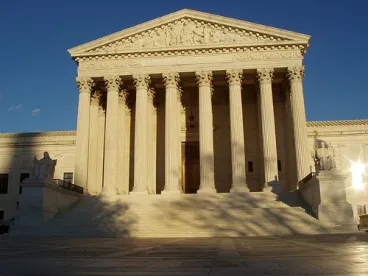In an unprecedented action, the U.S. Supreme Court has stayed implementation of the Obama administration’s Clean Power Plan regulations. The case is now under review by the U.S. Court of Appeals for the D.C. Circuit, with a hearing set for June 2.
Background
The administration’s proposal to regulate coal-fired electricity generating power plants is commonly referred to as the Clean Power Plan (CPP). It seeks to achieve a 32 percent reduction by 2030 through a series of measures placing greater reliance on natural-gas-fired generators and renewables, like wind and solar.
CPP takes a systems-based rather than a source-based approach. In determining the potential for carbon reductions, it takes into account not just the power plants themselves, but the entire electricity system, all the way down to consumers. It would allow states to reduce emissions through a number of measures that take place outside the power plants, including building out renewable energy and boosting end-use efficiency, as well as emissions credit trading.
This “outside the fenceline” approach to regulating greenhouse gases is the major argument of the opposition, who claim the Environmental Protection Agency (EPA) exceeded its authority under the Clean Air Act. The challenge, led by a coalition of 29 states and state agencies, is a significant victory for the opposition.
Effect in the U.S.
Industry estimates that the plan, once in full effect, would lead to the closing of more than fifty coal-fired plants. The EPA and the Justice Department’s lawyers dispute that estimate.
Jody Freeman, a Harvard law professor and former environmental legal counsel to the Obama administration, told The New York Times that the ruling suggests a “high degree” of skepticism toward the CPP from five justices on the court.
Even if the rule is ultimately upheld, the Supreme Court’s stay could significantly impact compliance timelines for states and utilities. As it stands, the EPA will be unable to enforce its September deadline for states to submit compliance plans or request an extension. Without enforcement from the EPA, states may have to decide on their own whether to comply.
Challenging parties argued that the rule was already prompting states to write compliance plans and forcing power companies to make decisions on whether to retire coal-fired power plants, or avoid making investments in new plants. Most states are now expected to halt their compliance efforts. Sen. Majority Leader Mitch McConnell (R-Kentucky) had already been urging governors to refuse to comply with the plan. “These regulations are, in my view, likely illegal,” McConnell said.[1] “[The] Supreme Court order is just the latest sign of that. If nothing else, it shows we were right to let governors know their options.”
However, William Becker, executive director of the National Association of Clean Air Agencies, which represents[2] state regulators charged with implementing the carbon rule, said that efforts to reduce greenhouse gas emissions will not stop because of the decision. “Almost every state in the country has been working tirelessly over the past two years in preparing Clean Power Plan strategies,” he said. “We fully expect that many of these states will continue their efforts to reduce greenhouse gas emissions under their own legal authorities.”
The Democratic presidential candidates, Hillary Clinton and Bernie Sanders, have pledged to continue and strengthen President Obama’s climate change agenda, so a rule developed by their administrations would probably let the country meet its goals set by the Paris Accord.
But Republican contenders, including Donald J. Trump, Sen. Ted Cruz (Tex.) and Sen. Marco Rubio (Fla.), have questioned or denied the science of human-caused climate change and sharply criticized the climate change regulations and the Paris Agreement.
International Reaction
The decision could also weaken or even imperil the international global warming accord reached with great ceremony in Paris less than two months ago.
The Paris Agreement, the first accord to commit every country to combat climate change, had as a cornerstone President Obama’s assurance that the United States would enact strong, legally sound policies to significantly cut carbon emissions. The United States is the largest historical greenhouse gas polluter, although its annual emissions have been overtaken by China’s.
In the capitals of India and China, the other two largest polluters, climate change policy experts said the court’s decision threw the United States’ commitment into question, and possibly New Delhi’s and Beijing’s.
The top priority for Indian Prime Minister Narendra Modi remains to provide cheap electricity to the 300 million Indians without power. If the United States reneges on its commitments, “it really would strengthen the hand of those who say Paris was ineffective and a bad deal for India,” according to Navroz K. Dubash, a senior fellow at the Center for Policy Research in New Delhi[3].
“If the American clean energy plan is overturned, we’ll need to reassess whether the United States can meet its commitments,” said Zou Ji, the deputy director general of China’s National Center for Climate Change Strategy and International Cooperation, a government think tank in Beijing. There is also domestic resistance to low-carbon policies in China, and opponents are likely to say: “Look, the United States doesn’t keep its word. Why make so many demands on us?”[4]
“U.S. pushback is not something that’s unique to the United States,” said John Sterman, a professor of management at the Massachusetts Institute of Technology who attended the negotiations in Paris. “It’s happening all over the developed world.”[5] Poland and some other coal-reliant countries have resisted the EU’s commitment under the agreement to more stringently reduce emissions across its member states.
The stay is expected to last through much of the year, until the D.C. Circuit makes a final ruling. A decision in that case is expected in late 2016 or early 2017. Regardless of the outcome, the decision is likely to be appealed by either foes or proponents, and sent to the Supreme Court for a full merit review.
White House officials insisted that the rule would eventually be upheld, and that given the timetable for litigation and for meeting the target, the United States could still achieve its Paris commitment.
[1] Davenport, Supreme Court’s Blow to Emissions Efforts May Imperil Paris Climate Accord. (Feb. 10, 2016).
[2] Pyper, Breaking: Clean Power Plan Stayed by Supreme Court, Obama Handed a Setback. (Feb. 9, 2016).
[3] Davenport, Supreme Court’s Blow to Emissions Efforts May Imperil Paris Climate Accord. (Feb. 10, 2016).
[4] Davenport, Supreme Court’s Blow to Emissions Efforts May Imperil Paris Climate Accord. (Feb. 10, 2016).
[5] Davenport, Supreme Court’s Blow to Emissions Efforts May Imperil Paris Climate Accord. (Feb. 10, 2016).




 />i
/>i

